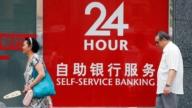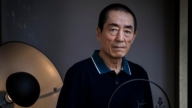【新唐人2011年10月7日訊】中國大陸女星姚晨是中國的“微博女王”,她在新浪微博的人氣排名第一,擁有1300多萬粉絲。 10月4號,姚晨在微博上與《環球時報》的總編輯胡錫進大打口水戰,為北京計程車司機爭取權利,網友一邊倒的支持姚晨,認為胡錫進“不食人間煙火”。請看記者的報導。
北京民眾現在抱怨打車難的情況越來越嚴重。中共《人民日報》旗下的《環球時報》總編胡錫進10月4號在自己微博中說,解決北京出租車難打的解決辦法是「提高出租車價」。他說,因為「出租車太便宜」,導致中國人「打車過於隨意」,違背規律,難以持久。
姚晨在4號當天評論這位黨媒總編說,“胡主編可能太少打出租車了,調高打車費,不如先降低司機每月要繳納的“份子錢”,每月高達五千多呢,不是小數目。”
趙培﹙評論員﹚:中國的出租車牌是由中國各地的市政府發放的,但是這種車牌的發放是被市政府控制的,這樣在市面上的車牌就非常稀少,大部分被各個出租車公司和車主控制,這樣就形成了車主和出租車公司這樣的壟斷階級。他們就向出租車司機徵收類似承包費的“份子錢”。
胡錫進隨即反駁,諷刺姚晨 “微博定個調調,大家一起背誦” ,好像在背臺詞。姚晨在10月5號反擊胡錫進“您想貶損我,別扯上大家啊。’定調’我們真不懂,這方面您是行家。順便也說一句,您說得還不如臺詞呢,聽著像夢話。”
姚晨的反擊得到4600多網友的評論支持,他們認為,胡錫進“解決北京出租車難打的解決辦法”—- 「提高出租車價」,完全是讓出租車為富人服務,不懂大多數工薪階層的辛苦,是逼迫窮人去走路。
趙培﹙評論員﹚:其實從2004年開始由於汽油價的高漲,出租車司機在“份子錢”和“汽油價”雙重的壓榨下生活是十分艱難的。因此,從04年開始我們看到在全國各地大概有近百起的出租車司機停運事件,比如上海、杭州、溫州都出現出租車司機停運來抗爭“份子錢”和“高油價”的情況。
姚晨和胡錫進的口水戰,也引來中國「政法大學」法學院副院長何兵的助戰,他力挺姚晨,認為政府應該開放出租車牌照,允許更多的個體經營者出現,“份子錢”自然降低。而且還會增加兩百萬的就業機會。
新唐人記者周平、肖顔採訪報導。
Actress Criticizes China』s Ongoing Taxicab Problem
Chinese actress, Yao Chen, known as the “queen of Weibo,”
ranks number one on Sina Weibo, a Twitter-like website in China, with 13 million fans.
On October 4, Yao started a debate on Weibo with
the editor-in-chief of Global Times, Hu Xijin.
She sharply criticized his “party-media-style” approach to
the ongoing Beijing taxicab problem.
Netizens showed strong support for Yao, saying that
Hu』s views on Chinese people』s way of life were nonsense.
Recently, residents are complaining more and more about
how difficult it is to find an empty taxicab in Beijing.
On October 4, Hu Xijin, the editor-in-chief of Global Times,
which operates under the auspices of the People』s Daily,
an official Chinese Communist Party (CCP) mouthpiece,
said on his own Weibo page that only by raising taxi fares can this problem be solved.
Hu said, “Low taxi fares go against the regular
market rules and this won』t last long.”
On the same day, Yao Chen responded to Hu』s words saying,
“I guess Editor Hu seldom takes taxis.” She added,
“Instead of raising taxi fares, why not reduce the more than
5,000 yuan (US$784) taxi licensing fees that drivers pay each month?”
Zhao Pei, a political commentator: “In China, taxi licenses
are issued and controlled by local government agencies,
so very few of them are available to individual owners.
Most licenses are possesed by taxi companies.
These government agencies collect high taxi licensing fees
from those taxi license holders.”
Hu responded to Yao by saying: “When you reach a conclusion
on something, everyone on Weibo follows your line of reasoning,” like learning lines in a script.
On October 5, Yao sharply criticized Hu telling him
“not to involve her fans when criticizing her personally.”
Yao said, “We are not as versed as you are in using mass media
to attack others” adding, “By the way, from your words it sounds even more ridiculers than a dream talk.”
More than 4,600 netizens commented on Yao』s Weibo
to show their support.
One person commented: “Hu』s suggestion of raising taxi fares
would lead the way for the whole taxi industry to serve only the rich.”
Another person said: “Hu prefers that low-income people walk
to where they need to go rather than taking the time to understanding their hard life.”
Zhao Pei, a political commentator: “Since oil prices have risen
sharply in 2004, taxi drivers are facing tough times dealing with both high licensing fees and high gas prices.
As a result, we』ve seen nearly 100 taxicab strikes all over China.
For example, the taxi drivers in Shanghai, Hangzhou and Wenzhou, have protested against these conditions by striking.”
The debate between Yao and Hu also caught the attention
of He Bing, vice-dean of the Law Department of the China University of Political Science and Law.
He strongly supports Yao Chen』s opinion and further suggests
that the government should relax its control of taxi licenses and allow more individual owners.
He believes that taxi licensing fees would naturally drop and
2 million job opportunities would thus be created.
NTD reporters Zhou Ping and Xiao Yan





























